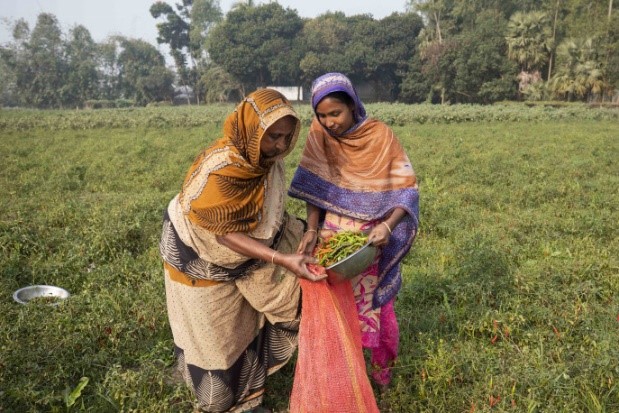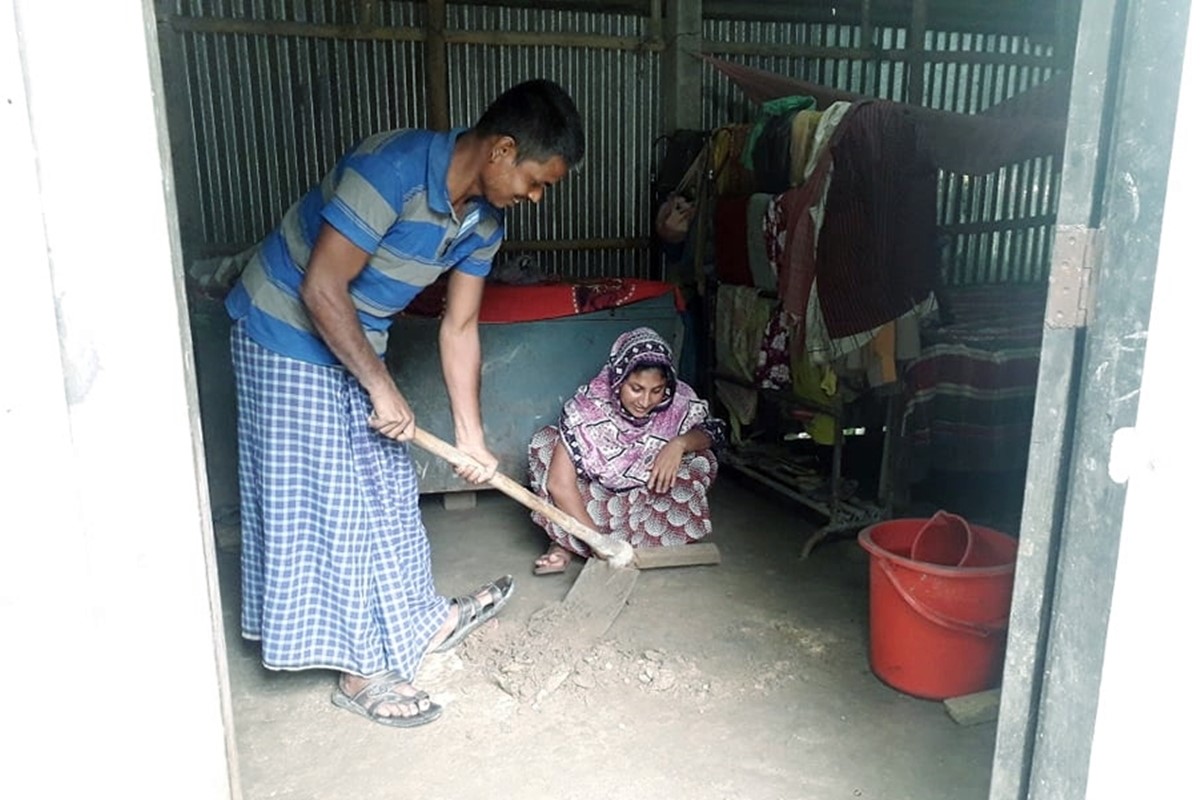An Inclusive, Resilient and Gender Responsive Roadmap to Recovery
Friday, October 30, 2020

By Ellie Wong, Khandoker MD Ruhul Amin and Abby Fried
COVID-19 is not gender-neutral
COVID-19 exposes and exacerbates pre-existing inequalities, including gender inequalities. Here are three ways this is unfolding.
First, global predictions of poverty and food insecurity are wide-ranging, with World Vision’s primary data across 24 countries confirming that as households are struggling to cope with loss of incomes, meeting basic needs is growing challenge. UN Women’s recent report predicts the rise of female poverty with gender gaps worsening by 2030, especially for women between 24-35 years old.[1]
Second, the pandemic has exposed the close interrelationship between economic and social systems – between market systems and social norms. Economic markets were segmented by gender before COVID-19, with women concentrated in the informal and lower-paid sectors. According to a 2019 World Bank report, men in male-led sectors earned 116 per cent more than women in women-led sectors. In 2020, we know the informal sector and many women-led sectors face significant risks in the face of shocks associated with the pandemic. Agriculture is no exception. Women work alongside men as producers, consumers and employees in agricultural markets. However, around the world, women’s work on farms are under-valued, underpaid and under-recognised.
Third, the pandemic made clear the dependency of economies and markets on unpaid care work. As it is not measured in GDP, we often fail to recognise the economic value of unpaid care work. During COVID-19, there are increased risks to women who are shouldering the lion’s share of this work with both social and economic costs. Before the crisis, women performed three times the total hours of unpaid care work compared to men. According to CARE’s rapid gender analysis in 2020, women's care work is expected to rapidly increase due to the pandemic given increased care requirements linked to school closures.
The pandemic’s disruption in the status quo puts us at a crossroads: will we apply a gender lens to realise more inclusive markets and societies or put it in the ‘too hard’ basket? The cost of inaction is clear. UN modelling shows in the most negative scenario, where women experience disproportionate unemployment during COVID-19 and no action is taken, global GDP would be $US1 trillion lower in 2030 than the current levels. However, by taking action on gender equality throughout the next decade, global GDP estimates in 2030 are $US13 trillion more than the most negative scenario.
Roadmap to recovery

Table 1: World Vision’s approach to recovery: inclusive market systems development (iMSD) and women’s economic empowerment (WEE).
We need to ‘build back better’ more inclusive, resilient and greener economies by investing in economic recovery that is centred around pro-poor, women’s economic empowerment (WEE) and climate-smart outcomes.
World Vision’s inclusive market systems development (iMSD) approach (see Table 1) promotes market systems change that include poor and marginalised groups, while also strengthening productive capacity of these groups. It is critical to work through market actors and private sector partners on gender inclusive and resilient business models that productively engage poor women and men as producers, employees and consumers.
However, recognising people at different poverty levels require different support, World Vision also integrates household interventions. This includes business, financial literacy and market linkage training to ensure equitable participation, and promote resilience to economic, social, health, environmental and other shocks.
Gender-based constraints are addressed across this hybrid approach. We need to continue to make the business case for gender equality with the private sector. However, to realise equitable opportunities for women in practice, it’s essential to address social norms and work towards transforming gender relations in households, communities and market systems.
Women’s economic empowerment in Bangladesh

Photo: Salahuddin Ahmed Paulash
Despite significant progress in poverty reduction in Bangladesh in recent years, about 22 million people still live below the poverty line largely in rural areas. Although women have made many strides forward in recent decades, labour participation rates of women are 36.3 per cent compared to 81.7 per cent of men. Many have vulnerable jobs through informal, unpaid or unrecognised work - including in agriculture where the gender wage gaps are significant.
Funded by DFAT’s Australian NGO Cooperation Program (ANCP), the Nutrition Sensitive Value Chain for Smallholder Farmers (NSVC) Project (2017-2023), aims to improve economic empowerment, nutrition and gender equality outcomes for 20,000 farmers (65 per cent women) and their households (90,000 people) in Jamalpur, north-central Bangladesh.
To promote inclusion, World Vision is adopting a hybrid iMSD and WEE approach, which has sought to work at both the household and system levels. To respond to the lack of access to quality agri-inputs, the project developed new partnerships between private companies and producer groups, including agri-input suppliers especially those promoting hybrid seeds like Petrochem Bangladesh Limited and Ispahani Agro. The project is working in rice, maize, chili, eggplant and leafy greens. At the household level, the project has supported farmers to engage in collective buying and selling through producer groups. Producer group leaders received trainings on improved production and post-harvest technologies, commercial farming and basic financial literacy, which has then been cascaded to all group members. This has not only helped to create economies of scale with vulnerable groups to strengthen their engagement with market actors in a trade relationship, it has increased women and men’s access to new skills and opportunities including how to engage with market actors and how to increase production yields.
To promote WEE outcomes, NSVC is centred around three key strategies. First, the project focuses on value chains where there are opportunities and lower entry barriers for women. For example, in addition to strong market demand and profitability potential, chili has strong WEE potential given women were already working and accepted in this value chain. Women could more easily participate in chili given lower input costs and the ability to work close to home. NSVC has supported these women to take up new roles in the market system, including marketing. The project has also piloted a women’s entrepreneurship initiative such as tillage, irrigation, threshing (service market) and mobile seed selling (input market) opportunities. This has responded to unmet needs in different parts of the selected value chains, while raising the visibility of women in Jamalpur.
Second, NSVC has focused on making the business case for women. In World Vision’s assessments in 2018, we found common negative perceptions in communities such as: "If women go to agricultural land, crop production will be less" (Focus group discussion - male farmers). Furthermore, women’s work in post-harvest processing was consider ‘easy’, despite providing an important value addition to the final selling price of crops. Initially, private sector partners were reluctant to engage with women-only producer groups, fearing that they were not the key decision makers when buying inputs. However, the project engaged agri-input companies on opportunities to expand their customer base in the Jamalpur region, and the women’s husbands were also engaged in the process.
Third, NSVC has adopted a gender-transformative approach, recognising the intersection between social norms and market systems. To enhance WEE solutions, it is essential to engage women’s male partners in transforming norms around gender roles both within and outside the home. The project has partnered with Promundo to engage men and boys as allies in WEE. Promundo with World Vision has worked to adapt Promundo’s Mencare approach, which seeks to promote gender equitable relations and positive social norms at the household level, including joint decision making and men taking on a greater share of the care work. This has been complemented by community level norm change, including folk songs, male champions, women role models and community dialogues.
Making women visible and valuing their work
Half-way through the project, this holistic approach to WEE has shown promising results, even as the sector is grappling with COVID-19 and how to ‘build back better’. While we are still finalising the mid-term evaluation**, initial findings are positive. There was an increase in total annual household income from target crops from USD 125 to USD 208 from baseline in 2018 to midline in 2020.
Chili is one example. At baseline, 64 per cent of producers in Jamalpur sadar sub-district – many women - cultivated chili with traditional methods of retained seeds with low production yields. At the mid-line, 70 per cent of producers have adopted hybrid seed technology. This has contributed to production more than doubling from 3.5 metric tons per acre to 8 metric tons per acre. This has led to an 193 per cent income increase from $US126 to $US369 from baseline to midline for chili.
Harmful notions of masculinity were a key challenge at the start of the project amongst many families in the community. Md. Jaminur Islam explains: “In our society, neighbours used to criticise the husbands who help their wives by addressing them as the slave of their wife. That’s why I never bothered to help my wife at household work and didn’t allow her to contribute in the family decision making.”
He said: “…after attending the ‘MenCare’ sessions, gradually my thoughts are being changed. Now I take my wife’s opinion while taking even the minor decision of the family, which helps us to make an appropriate decision.”

For Md. Jaminur Islam and Rasheda Akter – a relationship centred around gender equality – has been a source of resilience and strength as husband and wife during COVID-19. Photo: Ruma Yeasmin, World Vision International (2020)
During COVID-19 Jaminur Rahman said his wife Rasheda Akter supported him mentally to overcome the frustration, and he helped with the care work during the crisis. “We will reduce our extra family cost and will be on the same page together to share our agonies and any problems as the same family members.”
Looking to the future
The lessons from Bangladesh highlight the immense opportunity that we have as a global community to ‘build back better’ a more inclusive economic recovery for current and future generations of women, men, girls and boys. We cannot afford to waste it.
Women play an important role in economic markets, especially agri-food systems. We need to apply a gender lens, which can help to promote more inclusive and better functioning markets. Therefore, economic recovery programs need to explicitly address both pro-poor and WEE outcomes. There is a tendency to think about social norms as somewhat abstract and separate from the markets when they are in fact closely linked to how women and men experience markets and how they see themselves and others. Programs can ‘nudge’ behaviour and shift harmful gender norms by making women visible and valuing their work. Over time, it’s possible to shift mindsets and behaviour of market actors, communities and households. This will have ripple effects, including on future generations. The women in Jamalpur sum it up best.
Morjina Begum, a chili farmer in the NSVC projects says: "I sold dried chili at Tk1,200 ($US14) per mound this season, green chili at Tk1500-1600 ($US18). …since we rural women do not hold office jobs, farming is our real job. I am happy with the earnings…[My daughter] will hold a job when she grows up, she can also do farming if she wants to. A woman can do anything, right?”
**The full NSVC Mid-term evaluation is still being finalised and an evidence and learning brief will be developed later this year.
Ellie Wong is Acting Manager, Senior Women’s Economic Empowerment Advisor, Social Entrepreneurship and Economic Development (SEED) unit, World Vision Australia, Khandoker MD Ruhul Amin is the Value Chain Specialist at the Nutrition Sensitive Value Chains for Smallholder Farmers (NSVC) project, World Vision Bangladesh (WVB). Abby Fried is a Programme Officer at Promundo.
Ellie Wong, Ruhul Amin and Abby Fried are presenting at the SEEP 2020 conference on October 30, 2020, Track 4 Technical Stream 4: The Promise and Perils of Inclusion in a New World.
10:15-11:15am CET | 5:15-6:15am: An Inclusive, Resilient and Gender-Responsive Roadmap to Recovery
https://seepannualconference.org/Agenda
Opinion Pieces,
Asia and the Pacific
Back to all Results